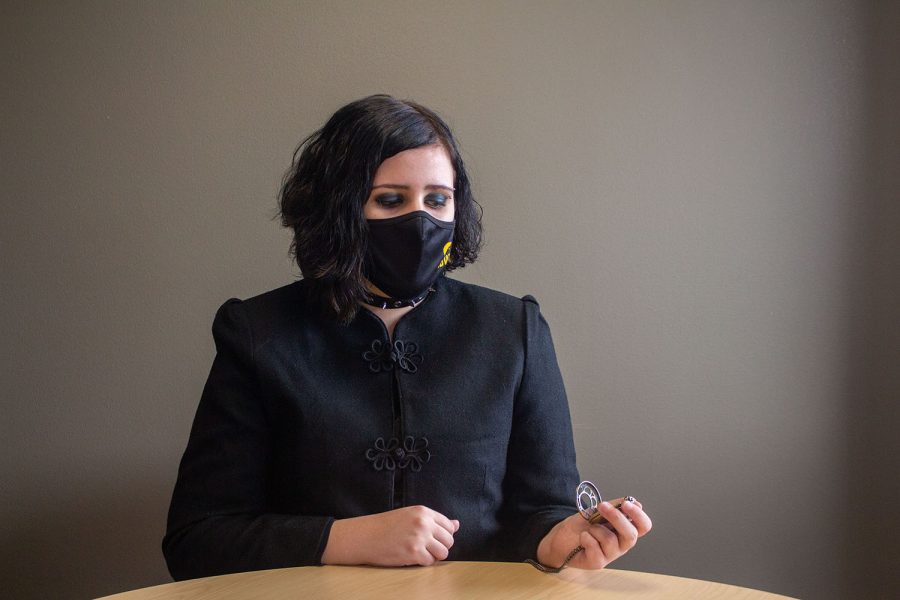The Ten-Minute Play festival to bring out underutilized talents in its participants
Undergraduates have navigated the world of virtual theater by utilizing their talents and broadening their skill sets through the Ten-Minute Play Festival, which premieres on Feb. 27.
University of Iowa freshman, Lily Woodard, poses for a portrait in a Daum Residence Hall lounge on Thursday, Feb. 25. She had to perform for the 10-Minute Play Festival alone in the lounge over Zoom because of COVID and provide her own costume. Woodard said, “The show must go on.”
February 25, 2021
Undergraduate playwrights and actors have had the opportunity to showcase their talents through the University of Iowa Theatre Department’s Ten-Minute Play Festival for 24 years. Like most theater events this year, the six performances will be available to stream on the department’s YouTube channel on Feb. 27. However, this is the first virtual performance to be written and executed entirely by undergraduates.
This year’s festival includes other new elements, including its first virtually animated play.
Animator and playwright Jacob Smithburg used the skills he learned from earning an associate degree in animation from Southeastern Community college, as well as YouTube tutorials, to create his first play.
Creating a play wasn’t on Smithburg’s to-do list last year. Prior to the pandemic, he planned to intern for The Walt Disney Company. When it became clear that the pandemic wreaked havoc on the entertainment industry, Disney sent Smithburg and the other interns back home.
Now, Smithburg is a junior at the UI pursuing a degree in film, spending most of his free time staying up late to animate his play, Investigative Crustacean Salinization: Postmodern Underwater Murder Party for the Ten-Minute Play Festival.
The primary program Smithburg used for his animation is called EbSynth. The software allows exported image sequences to be drawn over, so live-action actors can become animated. Instead of having to animate every individual frame, EbSynth is able to synthesize movement sequences from live-action actors to carry over the animator’s stylized version of the performers.
In order to make the process easier, Smithburg used some practical effects during filming, such as having actors who played jellyfish and an octopus wear beanies for a circular head shape and had them move their hair like tentacles.
Smithburg said despite having tired wrists from drawing and tired eyes from staring at a computer screen for hours, he enjoyed the experience.
“I think it’s great, being able to experiment,” Smithburg said. “Going forward, I want to continue doing more EbSynth stuff with [the Theatre Department], even when COVID is over.”
Like Smithburg, this is also Alexis Vaselopulos’ first time having her work performed at the UI. The senior theatre arts and psychology student directed her play, A Part, in addition to writing it.
Inspired by the absurdist plays of Samuel Beckett, Vaselopulos decided to write about growing up and growing apart from friends in an increasingly confusing world.
RELATED: UI graduates uplift Black voices in new film, “nature of the dream”
“What I really wanted to do was a take on what it means to be in a friendship with someone as emerging adults. The world right now is so complex and scary, and there’s a lot we don’t know,” Vaselopulos said.
While directing, Vaselopulos drew from the emotions she said she experienced during the pandemic.
“We’re living in a time of intensity and sadness,” Vaselopulos said. “The end of the play is sort of a reconciliation that while nothing is ever really going to be back to normal, there’s a hope that these two characters can rebuild their lives, and this experience made them better.”
Despite the sad subject matter, Vaselopulos has found watching her play come to life cathartic.
“It’s a really absurd time, nothing makes sense,” she said. “But if you can find a way to break it down that’s comedic and powerful, we can find ways to talk about it.”
The show was recorded over Zoom from each actor’s home, which presented some audio and visual challenges. Vaselopulos said that in the end, everything turned out well, which fit perfectly with her playwriting philosophy.
“My goal with this show, and any show, is to give people a sense of hope at the end,” she said.
While Vaselopulos is approaching the end of her undergraduate theater experience on a high note, freshman Lily Woodard is just beginning, though the pandemic has caused an unusual introduction to the theater program.
While excited to be part of Blossom This Orange Menagerie, she ultimately views the virtual format as a hindrance to her theater education.
She said the lack of physical and social interaction, stage directions, space utilization, and not having a need for projection are setbacks, because she won’t be able to practice those skills until they return to in-person productions.
Woodard added that the situation caused her to think about her character choices more deeply because she doesn’t have the luxury of being able to make adjustments based on live audience reactions.
“Theater is a very social thing, so it’s kind of bringing things back to thinking about acting in a more fundamental way,” Woodard said.
Woodard said that despite the challenges, she said she is happy to have the opportunity to act in any format.
“Any theater is enjoyable. I decided to be a theater major because I couldn’t imagine not having it in my life,” Woodard said. “Even though it’s different this year, I’m glad they decided to have the Ten-Minute Play Festival.”




